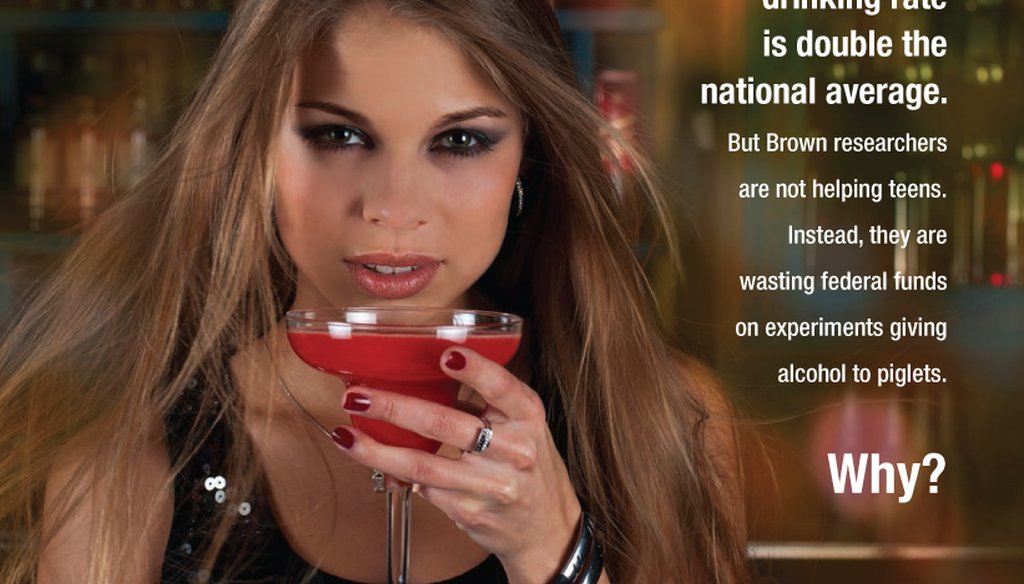



Advertisement from the Physicians Committee for Responsible Medicine
Rhode Island was treated to an interesting do-the-ends-justify-the-means debate last week when the Washington, D.C.-based Physicians Committee for Responsible Medicine criticized a research study by Rhode Island Hospital and Brown University that uses young pigs to study the effects of alcohol consumption on the heart.
Besides objecting to the treatment of the animals involved, the committee argued that the money spent on such research could be better used elsewhere in the Ocean State.
To drive that point home, the committee has begun an advertising campaign with posters on five Providence bus shelters, claiming "Rhode Island’s teen binge drinking rate is double the national average. But Brown researchers are not helping teens. Instead, they are wasting federal funds on experiments giving alcohol to piglets."
We’ll pass on whether getting pigs drunk is a waste of federal money. But we wondered whether Rhode Island’s rate of teen binge drinking is that high.
Two federal agencies that track teenage alcohol use, the Substance Abuse and Mental Health Services Administration and the Centers for Disease Control and Prevention, define binge drinking as having five or more drinks at the same occasion, at the same time or within a couple of hours.
Physicians Committee spokeswoman Jeanne S. McVey said the group came up with its statistic by using data from two federal agencies that track, among other things, alcohol use by the nation’s teenagers.
She cited a 2012 survey by the federal Substance Abuse and Mental Health Services Administration that found that 7.2 percent of respondents aged 12 to 17 nationwide reported at least one instance of binge drinking over the previous 30 days.
But that study didn’t break down its findings by state. For a Rhode Island number, McVey said, the committee turned to a 2013 survey by the federal Centers for Disease Control and Prevention, called the Youth Risk Behavior Surveillance Study, a survey of a cross section of the nation’s high school students, done every two years.
According to documents posted on the state Health Department website, that survey found that in Rhode Island, 15.1 percent of responding students in grades 9 through 12 said they had at least one binge-drinking experience in the previous 30 days.
Rhode Island’s 15.1 percent, as reported in the CDC study, is more than twice the national average of 7.2 percent, as reported in the SAMHSA study, McVey said.
But those are numbers from two different studies. Is it legitimate to compare them in that way?
No, said statistician Jeffrey E. Jarrett, a professor of finance decision science at the University of Rhode Island.
To be valid, Jarrett said, comparisons must be drawn from the same data -- in other words, surveys that ask the same questions to the same people. Even a slight difference in wording between questionnaires can make a difference.
"The only way to compare is to compare things within the same study," he said.
To get an apples-to-apples comparison, we returned to the CDC study. The agency has not yet compiled national averages for its 2013 study.
But in its 2011 survey, the Rhode Island teen binge-drinking rate was 18.3 percent, compared with 21.9 percent for the nation as a whole. So the Rhode Island rate was actually less than the national one, not double.
When we pointed out the flaws in the committee’s methodology, McVey acknowledged that the organization could have been more careful.
"We now see that we should have had an expert in statistics double check, because we were comparing one set of national statistics to one set of local statistics," McVey said. " … If we were to do it over again, we would certainly word it differently."
"Our larger point is true," she added. "Federal funds should go to helping people rather than to animal experiments that often do not result in treatment for human patients."
Our ruling
Regardless of your opinion on the larger point, the Physicians Committee for Responsible Medicine sought to make it with an incorrect comparison.
It claimed "Rhode Island’s teen binge drinking rate is double the national average," deriving that claim by comparing numbers from two different surveys.
But the most recent report that includes both national and state-by-state figures show that Rhode Island’s rate was actually less than the national average.
We rule the claim False.
(To check our sources and find additional information, go to the extended version of this article at PolitiFactRI.com.)
Interview, Jeffrey E. Jarrett, University of Rhode Island professor of finance decision science, Dec. 18, 2013
Email, Jeanne S. McVey, spokeswoman, Physicians Committee for Responsible Medicine, Dec. 13, 2013
PCRM.org, "Ads Slam Alcohol Experiments on Live Animals," Physicians Committee for Responsible Medicine, accessed Dec. 18, 2013
SAMHSA.gov, "Table 2.42B Alcohol Use, Binge Alcohol Use, and Heavy Alcohol Use in the Past Month among Persons Aged 12 or Older, by Demographic Characteristics: Percentages, 2011 and 2012," Substance Abuse and Mental Health Services Administration, accessed Dec. 18, 2013
Health.RI.gov, "2013 Youth Risk Behavior Survey Results," Question 44, Rhode Island Department of Health, accessed Dec. 18, 2013
CDC.gov, "Youth Risk Behavior Surveillance, United States, 2011," accessed Dec. 13, 2013 and "Youth Online; High School YRBS Rhode Island 2011 and United States 2011 Results," accessed Dec,. 18, 2013, both from the Centers for Disease Control and Prevention
In a world of wild talk and fake news, help us stand up for the facts.
